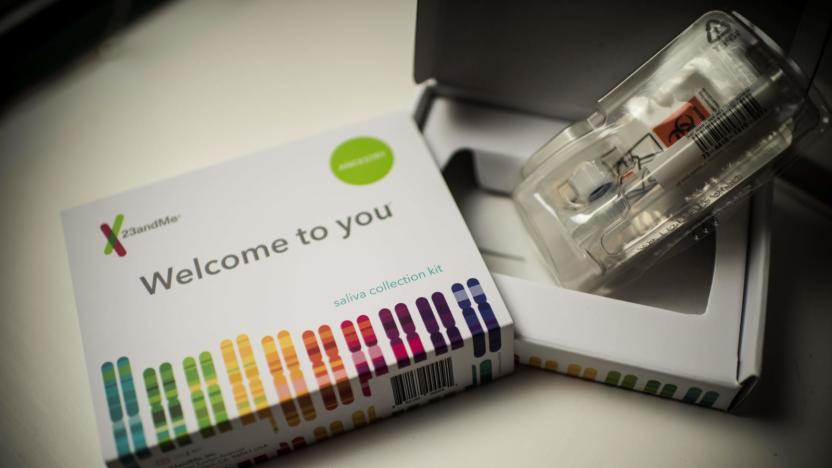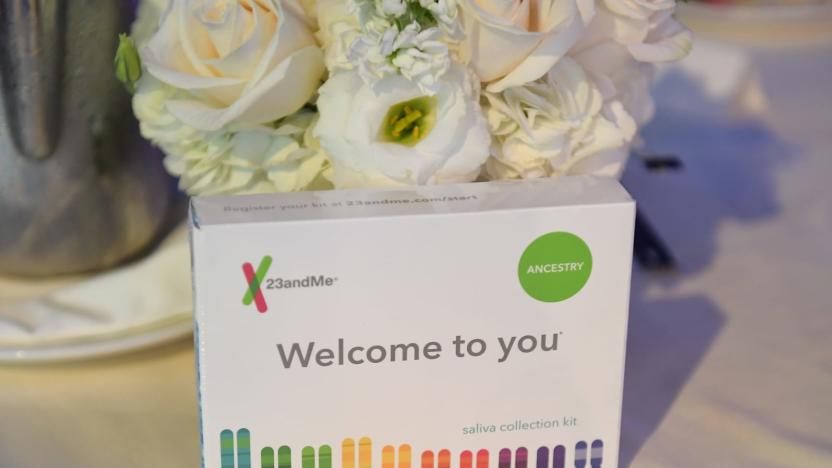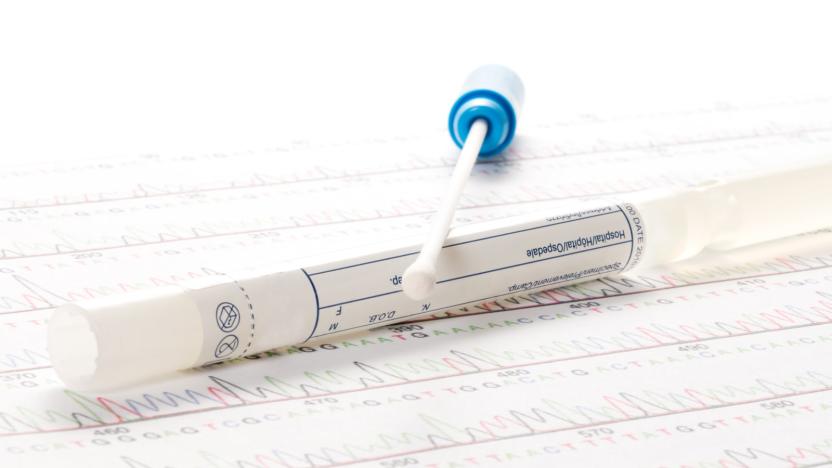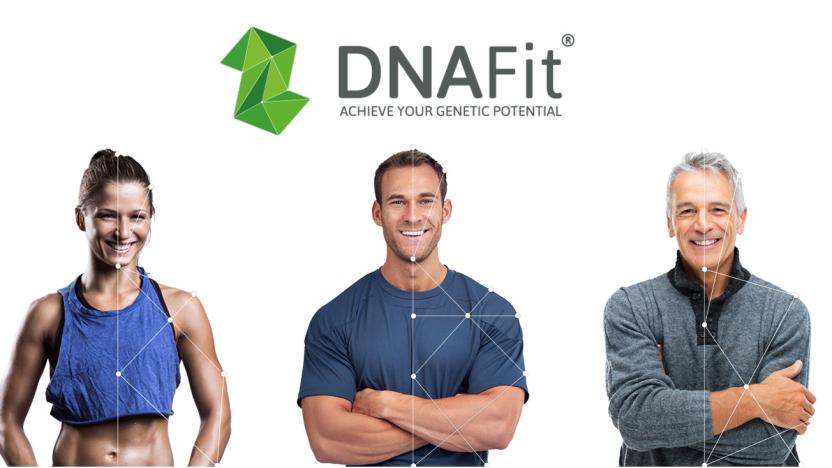genetictesting
Latest

23andMe says gene report can detect the risk of type 2 diabetes
23andMe is betting that its gene testing kits can help identify another major health risk: diabetes. The company plans to offer a report that identifies your genetic predisposition toward type 2 (that is, adult onset) diabetes. Unlike the company's earlier reports, the test provides a polygenic score based on gene variant research data from roughly 2.5 million customers, 70,000 of which reported diabetes -- it's not relying on any public information. Ideally, this would help you change your diet and habits to reduce the chance of developing diabetes.

23andMe, Ancestry and others agree to genetic privacy guidelines
A number of genetic testing companies, including 23andMe and Ancestry, have signed onto a set of guidelines that aim to address consumer privacy concerns, the Washington Post reports. The privacy best practices, drafted alongside the Future of Privacy Forum, state that companies should acquire "separate express consent" from customers before handing over their individual-level information -- like genetic data and personal information -- to certain third parties. It also says companies should disclose how many requests for information they receive from law enforcement. MyHeritage, Habit and Helix have agreed to the voluntary guidelines as well.

The FDA just changed how it reviews genetic health risk tests
FDA Commissioner Scott Gottlieb announced new rules today regarding direct-to-consumer genetic health risk (GHR) tests and the process by which they're approved for sale. In a statement, Gottlieb explained that these sorts of tests can provide more and more information as the technology develops, information that is not only in demand but could also serve as a useful medical tool. "These tests can prompt consumers to be more engaged in pursuing the benefits of healthy lifestyle choices and more aware of their health risks," said Gottlieb. "Consumers are increasingly embracing genetic health risk testing to better understand their individual risk for developing diseases."

Navajo Nation may undo genetic research ban in hopes of better care
The Navajo Nation banned genetic studies in 2002 due to concerns over how its members' genetic material would be used, but, as Nature News reports, the Navajo are considering a reversal of that policy. An oncology center is set to open next year on Navajo lands and the tribe's research-ethics board is looking into allowing some genetic research to take place at the facility.

Color's breast and ovarian cancer DNA test is $99 through October
During Ovarian Cancer Awareness Month (September) and Breast Cancer Awareness Month (October), genetic testing company Color is reducing the price of its new BRCA Test. The test -- which looks for mutations in the BRCA1 and BRCA2 genes that are linked to breast and ovarian cancer -- has a regular price of $149, but for this month and the next, customers can get it for $99.

Researchers use encryption to keep patients’ DNA private
There are a lot of valid security concerns when it comes to genetic testing and keeping your genome under wraps. But researchers at Stanford University have figured out a way to keep the vast majority of your genomic data hidden while looking for disease-associated mutations. The work was recently published in Science.

Genes, germs and bacon: A look inside my own DNA
There are times in your life when bad news smashes into your gut like a sledgehammer into the solar plexus. "You've got those double dots next to your CYP1A2*F, which means that we class you as a fast metabolizer." But the man on the other end of the phone was not complimenting me. Rather, he was explaining that my body can't cope with the chemicals produced by smoked or chargrilled meat. It meant that, despite my love of meat, I would have to limit myself to "just one or two servings of grilled or smoked meat per week," and even that was excessive. The news got worse when I was told that, for a similar reason, I should also avoid fried bacon -- which I eat every morning to pep up my protein-and-fat rich breakfast of eggs. My genetic makeup, the bastard, has rendered me incapable of enjoying bacon, which is a hard way to be introduced into the world of DNA fitness testing.

23andMe given permission to offer some limited health reports
23andMe has been given the green light to resume some, but not all, of the health reporting that the FDA prohibited it from carrying out in 2013. The startup launched with the pitch that a sample of your saliva was enough to tell you where your ancestors came from as well as if you would go bald in old age. Controversially, the company also told you if you were at risk of a wide variety of diseases, but never asked for permission to do so. That's why regulators shut it down, since the outfit was unable to supply the data to prove that the tests were accurate.

Supreme Court rules that naturally occurring DNA cannot be patented
In a plot twist straight out of Orphan Black, the Supreme Court has ruled that naturally occurring DNA cannot be patented, but synthetic biological material is fair game. The case involved Myriad Genetics, a company specializing in molecular testing, after it tried to patent two genes -- BRCA1 and BRCA2 -- that are often linked to breast and ovarian cancer. The Association for Molecular Pathology filed the suit, arguing that the patent would place undue restrictions on research since only Myriad would be allowed to tinker with those genes. The ruling established that isolating naturally occurring genetic material -- as Myriad did -- wasn't enough to justify legal ownership, but so-called complementary DNA (meaning it's man-made) would be eligible for patenting. Myriad had no comment at the time of this writing, but Sandra Park, an attorney with the ACLU Women's Rights Project said, "Myriad did not invent the BRCA genes and should not control them. Because of this ruling, patients will have greater access to genetic testing and scientists can engage in research on these genes without fear of being sued."

Oxford makes big push into Bigfoot research, enlists Swiss zoologists for DNA study
The search for Bigfoot continues and, no, that's not a nod to a very special episode of Unsolved Mysteries. Though Harry and the Hendersons did its best to humanize that monster of myth, a group of well-heeled European scientists are seeking to go beyond the Hollyweird fantasy to actually prove the creature's existence using advanced genetic techniques on Yeti remains. Part of a collaborative effort between Oxford University and the Lausanne Museum of Zoology, the Collateral Hominid project aims to gather material from public and private cryptozoological collections for analysis to determine whether that elusive species branched off from bears or our neanderthal forebears. Project head Prof. Bryan Sykes hopes the research, the results of which will eventually make the rounds of peer-reviewed journals, will dispel skepticism that has surrounded this controversial creature by providing " a mechanism for... identification that is unbiased, unambiguous and impervious to falsification." Basically, these real-life Mulder & Scullys want incontrovertible DNA proof that these fantastic ape-like beings are simply the stuff of evolution. Whatever the case, the truth is most certainly out there, folks -- it's just likely encased in fossilized dung. [Image courtesy Worch.com]

MinION USB stick decodes DNA in a matter of seconds
If you happen to be "special," then this $900 USB device is just about the worst thing ever. The aptly named MINion serves its masters by interrogating the cells of living organisms and rooting out their genetic secrets. We won't pretend to know exactly how it works, but it starts by pulling a strand of DNA through a razor-like nanotube that unzips the double helix. The nucleotide bases are then electrocuted one by one until they give up their code. The resulting sequence is stored like a ticker-tape readout, for the whole world to see. The MinION can complete its task in seconds and, unlike most other DNA sequencers, it's portable and simply plugs into a laptop. Luckily, it has so far only been shown to work on very short genomes, like those belonging viruses and bacteria, so for now you're probably safe.





